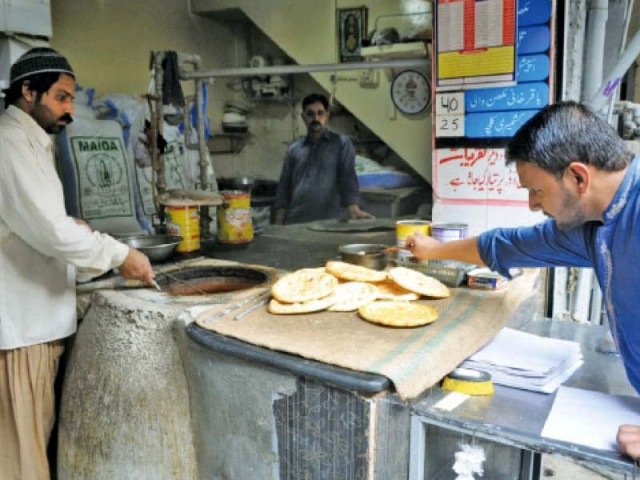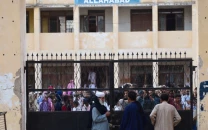Naan bread price cut by Rs5
K-P minister warns of strict action against profiteers

Workers prepare toasted sesame flatbreads for customers in a traditional oven at the Shahadat Naan Centre in Kartarpura Food Street, Rawalpindi. PHOTO: AGHA MAHROZ/EXPRESS
The Khyber-Pakhtunkhwa government has announced a significant reduction in the price of nan bread, aimed at easing the financial burden on the public.
Chief Minister Ali Amin Gandapur disclosed this decision on Monday following discussions with the Provincial Minister for Food, Zahir Shah Toru, and the Secretary of Food.
As per the notification issued, the new prices for 100-gram roti will be set at Rs15, while 200-gram roti will be priced at Rs30. Minister for Food, Zahir Shah Toru, emphasized the government’s commitment to the welfare of the people, noting that additional measures of a similar nature are under consideration.
Stringent measures will be taken against bakeries found guilty of overpricing, as warned by the minister. Additionally, it’s worth noting that the district administration of Peshawar has initiated a comprehensive crackdown against profiteers operating across the district.
On Sunday, approximately 42 shopkeepers, including butchers, milk vendors, vegetable, and fruit sellers, were apprehended and detained for overpricing.
Additionally, another two dozen received warnings. Special teams have been formed by the District Administration to scrutinize price lists in shops, responding to public grievances about the significant price hikes during Eid festivities, which had gone unnoticed by the authorities.
Notably, the price of tomatoes soared to Rs500 per kilogram in the local retail market in Peshawar, likely due to limited supplies during Eid, leading to widespread discontent. Despite the conclusion of Ramazan, when prices typically decreased, tomato rates remained high in the city. While the exact cause remains uncertain, retailers suggest that the constrained supply during the Eid holidays played a significant role.
“During Eid holidays, wholesale markets remain open, but both farmers and consumers refrain from bringing their produce to market, creating an artificial shortage of vegetables and fruits,” explained a shopkeeper to reporters.
While wholesale dealers usually store potatoes and some other vegetables, tomatoes have a limited shelf life and require cold storage, he added, expressing hope that the price surge would be temporary.
Despite assurances, both the provincial and district governments struggled to curb the prices of essential commodities during Ramazan, despite frequent raids and inspections. Furthermore, during Eid, these enforcement efforts were suspended due to official holidays.
Published in The Express Tribune, April 16th, 2024.









1733130350-0/Untitled-design-(76)1733130350-0-208x130.webp)









COMMENTS
Comments are moderated and generally will be posted if they are on-topic and not abusive.
For more information, please see our Comments FAQ